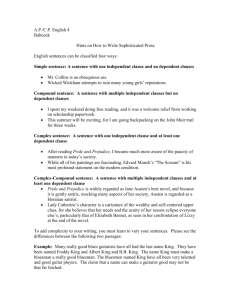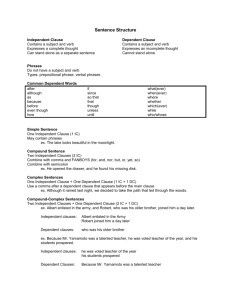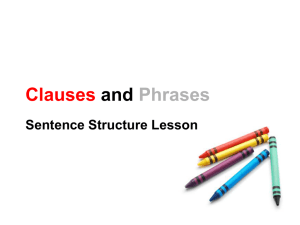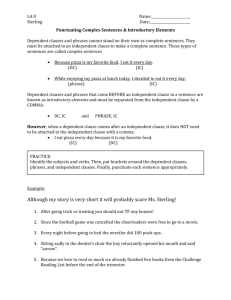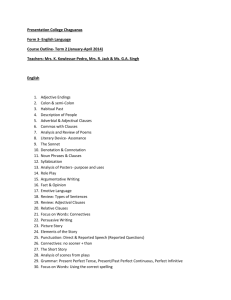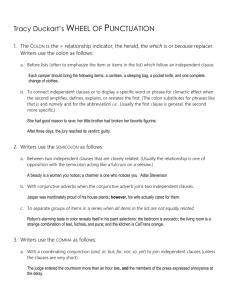English Syntax 2 Seminar
advertisement
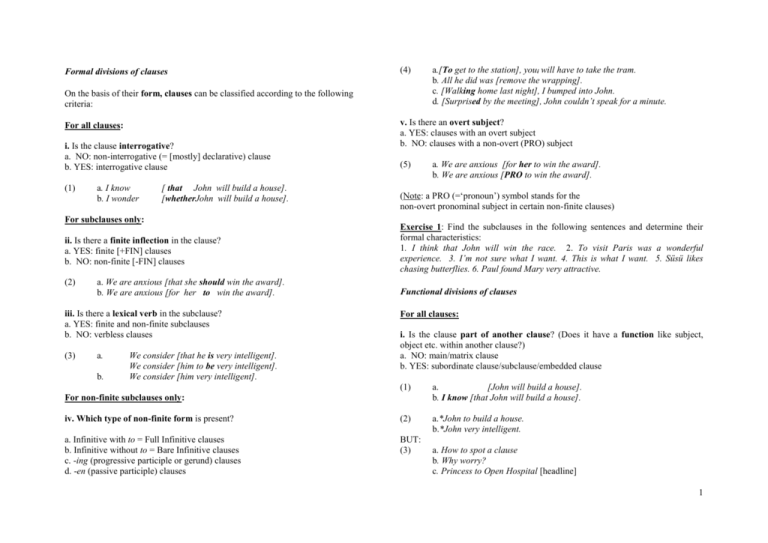
Formal divisions of clauses (4) On the basis of their form, clauses can be classified according to the following criteria: For all clauses: i. Is the clause interrogative? a. NO: non-interrogative (= [mostly] declarative) clause b. YES: interrogative clause (1) a. I know b. I wonder [ that John will build a house]. [whetherJohn will build a house]. For subclauses only: ii. Is there a finite inflection in the clause? a. YES: finite [+FIN] clauses b. NO: non-finite [-FIN] clauses (2) a. We are anxious [that she should win the award]. b. We are anxious [for her to win the award]. iii. Is there a lexical verb in the subclause? a. YES: finite and non-finite subclauses b. NO: verbless clauses (3) a. b. We consider [that he is very intelligent]. We consider [him to be very intelligent]. We consider [him very intelligent]. a.[To get to the station], youi will have to take the tram. b. All he did was [remove the wrapping]. c. [Walking home last night], I bumped into John. d. [Surprised by the meeting], John couldn’t speak for a minute. v. Is there an overt subject? a. YES: clauses with an overt subject b. NO: clauses with a non-overt (PRO) subject (5) a. We are anxious [for her to win the award]. b. We are anxious [PRO to win the award]. (Note: a PRO (=‘pronoun’) symbol stands for the non-overt pronominal subject in certain non-finite clauses) Exercise 1: Find the subclauses in the following sentences and determine their formal characteristics: 1. I think that John will win the race. 2. To visit Paris was a wonderful experience. 3. I’m not sure what I want. 4. This is what I want. 5. Süsü likes chasing butterflies. 6. Paul found Mary very attractive. Functional divisions of clauses For all clauses: i. Is the clause part of another clause? (Does it have a function like subject, object etc. within another clause?) a. NO: main/matrix clause b. YES: subordinate clause/subclause/embedded clause (1) a. [John will build a house]. b. I know [that John will build a house]. iv. Which type of non-finite form is present? (2) a.*John to build a house. b.*John very intelligent. a. Infinitive with to = Full Infinitive clauses b. Infinitive without to = Bare Infinitive clauses c. -ing (progressive participle or gerund) clauses d. -en (passive participle) clauses BUT: (3) For non-finite subclauses only: a. How to spot a clause b. Why worry? c. Princess to Open Hospital [headline] 1 For subclauses only: What function does the subclause have in the matrix clause? (10) a. I was not certain about the house. b. I was not certain whose house it was. ii. Types according to (phrasal) positions and functions: a. Su b. Complement functions: complement to a V: Od, (Oi), CS, (Co) complement to a P: Cp complement to an Adj: Cadj complement to a N: Cn (11) a. The news of his comeback came as a surprise. b. The news that he was playing again came as a surprise. (12) a. This book should be sent to all children fond of dogs. b. This book should be sent to all children who are fond of dogs. (13) a. They always slept right here. b. They always slept where the fire had been. (14) a. He caught more fish [than I expected]. b. He is not as clever [as I thought he was]/[as me]. c. Adjunct functions: adjuncts to an N: restrictive relative clauses (RRC) adjuncts to the V: adverbial adjunct clauses (=Al) comparative clauses (4) (5) (15) d. Peripheral functions adjuncts to a NP: non-restrictive relative cl. (NRRC) adjuncts to the CP: adv. disjunct & conjunct cl. a. Her mother, a retired teacher, lives in Boston. b. Her mother, who is a retired teacher, lives in Boston. (16) a. He has done very well, presumably. b. He has done very well, I believe. a. My visit to Paris was a wonderful experience. b. To visit Paris was a wonderful experience. (17) a. In addition, he's lost his job. b. What's more, he's lost his job. a. I know the reason. b. I know why they want it. (6) a. I gave this man a cup of tea. b. I gave whoever it was a cup of tea. (7) a. This is my wish. b. This is what I want. (8) a. You can call me anything. b. You can call me what you like. (9) a. It depends on their opinion. b. It depends on what they say. Exercise 2: Determine the functions and phrasal positions of the subclauses in the following sentences: 1. I wonder whether John will build a house. 2. We are anxious for her to win the award. 3. All he did was remove the wrapping. 4. Walking home last night, I bumped into John. 2 Exercise 3: Find the relative clauses in the following sentences: Relative clauses types: (i) acc. to function: (a) restrictive relative clause (RRC): the boy who(m) we met the boy that we met the boy we met the dress (that) we bought (b) non-restrictive rel. cl. (NRRC): my mother, who likes dogs the dress, which we bought there cf. my brother who is a vet vs. my brother, who is a vet (c) sentential: He wasn’t late, which surprised everyone. (ii) acc. to form: (a) wh-relative: the boy who(m) we met (b) that-relative: the boy that we met (c) zero relative: the boy we met (1) a. The thing [that we should buy] is a VCR. headed finite RRC b. The thing [e PRO to buy] is a VCR. headed non-fin. RRC c. [What we should buy] is a VCR. headless d. I remember [when I first saw Star Wars]. headless e. I remember the time [when I first saw Star Wars]. corresponding headed (2) a. She had never seen a film(,) [which was interesting]. [AMB!] a. We have got stars directing our fate. b. We have been making money since the day that we were born. c. That is just the way it is, baby. d. This will be the day that I die. e. You are my shoulder to cry on. f. You are the one I want. g. How do you do the things that you do? h. There are a lot of things going on in the world you don't know about. i. Every little thing she does is magic. j. There are a hundred billion castaways looking for a home. k. This library gets a copy of every book printed in Hungary. l. You’re face to face with the man who sold the world. m. Every breath you take ... n. Nick Rivers: Listen to me Hillary. I'm not the first guy who fell in love with a woman that he met at a restaurant who turned out to be the daughter of a kidnapped scientist only to lose her to her childhood lover who she last saw on a deserted island who then turned out fifteen years later to be the leader of the French underground. Relative clauses headless [+FIN] vs "headed", proper sentential [+FIN] vs restrictive [+FIN][-FIN] non-sentential vs non-restrictive [+FIN][-FIN] 3


